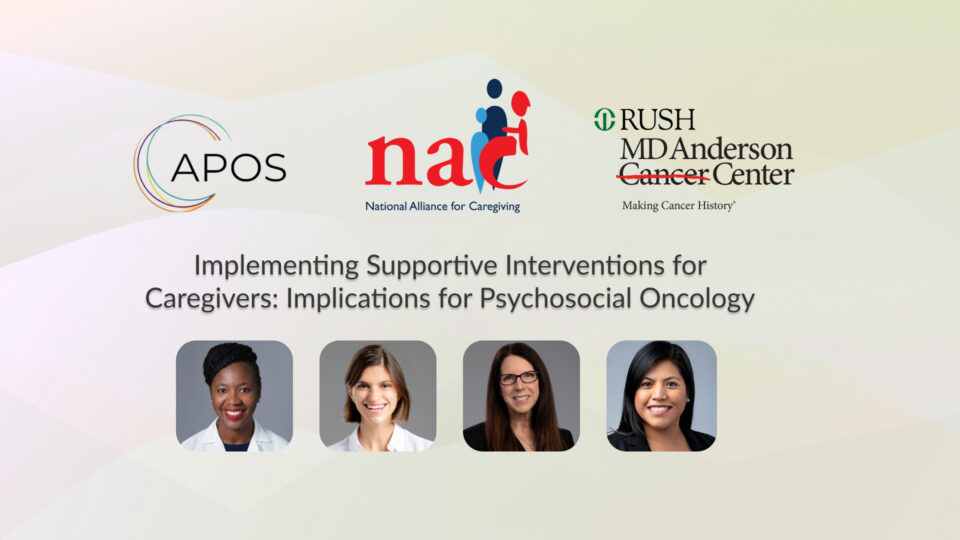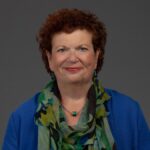
Implementing Supportive Interventions for Caregivers: Implications for Psychosocial Oncology
Information
Date & Time
-
-
Learning Objectives
Participants will be able to:
-
Describe at least 3 challenges that cancer caregivers face in obtaining support and training.
-
Summarize the policy landscape of recently enacted policies designed to support caregivers.
-
Evaluate a program designed by Rush University to support caregivers in primary care and its potential application to cancer care delivery settings.
Educational Goal
The educational goal of this workshop is to provide psychosocial oncology professionals, practitioners, and researchers strategies to better recognize, support and train caregivers in the oncology setting.
Description
Family members and friends often support their loved ones throughout cancer diagnosis and treatment experiences with little preparation, training, or support. Recent changes in policy have created opportunities and pathways for psychosocial oncology professionals to deliver training to caregivers. This webinar will provide cutting-edge information on research, policy, and practice on cancer caregiving from three organizations: the American Psychosocial Oncology Society (APOS), the National Alliance on Caregiving (NAC), and Rush University’s Caring for Caregivers Program.
Target Audience
- Counselor
- Marriage & Family Therapist
- Nurse
- Physician
- Psychologist
- Social Worker
- Substance Use Disorder Professionals
Presenters

Hermioni L. Amonoo, MD, MPP, MPH is the Carol C. Nadelson, MD Endowed Chair in Psychiatry at the Brigham and Women’s Hospital (BWH) and Associate Professor at Harvard Medical School. She is a physician-scientist and clinician educator in the Departments of Psychiatry and Psychosocial Oncology and Palliative Care at BWH and the Dana-Farber Cancer Institute (DFCI), where she directs the Well-being and Cancer Research Program. She is a graduate of Harvard Medical School, Harvard Kennedy School of Government, Harvard Chan School of Public Health, the Massachusetts General Hospital Adult Psychiatry Residency Training Program, and the BWH/DFCI Consultation-Liaison Psychiatry/Psychosocial Oncology Fellowship Training Program. Her research focuses on developing practical, cost-effective, and scalable psychosocial interventions for patients with cancer and their caregivers. Her work has consistently received funding from Harvard Medical School, Brigham Research Institute, the National Cancer Institute (NCI), the National Institute of Health (NIH), the Oppenheimer Family Foundation, the American Society for Hematology, the Robert Wood Johnson Foundation, and the Doris Duke Charitable Foundation.

Diane Mariani is a Licensed Clinical Social Worker and Program Manager for the department of Social Work and Community Health at RUSH University Medical Center in Chicago. She manages the Rush Caring for Caregivers model which supports family/friend caregivers of adults 60 years and older and leads the collaborative work of the “Ready, Willing and Able: Caring for Caregivers in Age-Friendly Health Systems – Dissemination Phase” funded by The John A. Hartford Foundation to share the Caring for Caregivers model with Age-Friendly Health Systems, Area Agencies on Aging, and other key stakeholders nationwide. Mariani’s passion for supporting family/friend caregivers was fueled during her previous role as oncology social worker for the RUSH Cancer Center.

Yadira Montoya is the Programs Director of the National Alliance for Caregiving (NAC). In this role, oversees key organizational initiatives that focus on building health, wealth, and equity for the fifty-three million family caregivers living in the US. Prior to joining NAC, Yadira has held leadership roles in academia, healthcare, non-profit, and the philanthropic sector. In 2019, she was recognized as a Culture of Health Leader by the Robert Wood Johnson Foundation for her leadership in community efforts that improve aging equity and the health and wellbeing of Latinx living with dementia and their family caregivers.

Dr. Rynar is an assistant professor in the Department of Psychiatry and Behavioral Sciences and the Department of Internal Medicine at Rush University Medical Center, and the Director of Supportive Oncology at the RUSH University Cancer Center. She also serves as a clinical psychologist for our patients and caregivers. Supportive Oncology is growing Prior to joining RUSH, she completed her fellowship in psychosocial oncology and solid organ transplant at Loyola University Medical Center. Dr. Rynar is a staunch advocate not only for cancer patients but also for survivors, families and caregivers. Under her direction, Supportive Oncology has grown exponentially to meet the needs of the growing RUSH cancer system via new, innovative programs. Her research interests include cancer-related distress and distress screening, coping style and models of supportive care delivery across the cancer care continuum.

Robyn Golden serves as the Associate Vice President of Social Work and Community Health and Chair of the Department of Social Work at Rush University Medical Center. She is Co-Director of Rush’s Center for Excellence in Aging and the Center for Health and Social Care Integration. She serves as the Principal Investigator for Rush’s Geriatric Workforce Enhancement Program (GWEP) and co-directs the Rush Center of Excellence for Behavioral Health Disparities in Aging. She leads Rush’s Caregiver Initiative, which draws together evidence-based practices into a single framework to improve care for older adults and caregivers, and she chairs the Campaign for Social Work’s Value in Improving Our Nation’s Health run by the Coalition for Social Work and Health. Her faculty appointments are in Nursing, Medicine, Psychiatry and Health Systems Management.
For over 35 years, Ms. Golden has been actively involved in service provision, program development, interprofessional education, research and public policy aimed at developing innovative initiatives and systems integration to improve health and well-being. In 2022, she received the American Public Health Association’s Insley-Evans Public Health Social Worker of the Year award. Robyn has served on the RRF Foundation for Aging Board of Trustees since 2023. In 2003-04, she was the John Heinz Senate Fellow for Senator Hillary Rodham Clinton, and she is a Past Chair of the American Society on Aging. In 2017, she received the Gerontological Society of America’s Maxwell A. Pollack Award for Productive Aging, and she served as a member of the National Academies of Sciences, Engineering, and Medicine (NASEM) committee studying the integration of social needs care into the delivery of health care. She is a fellow of the Gerontological Society of America and of the American Academy of Social Work and Social Welfare and is a National Association of Social Workers (NASW) Social Work Pioneer. Ms. Golden holds a master’s degree from the University of Chicago and Bachelor’s degree from Miami University.

Erin E. Kent, PhD, MS, FSBM is an Associate Professor and Associate Chair for Research in Health Policy and Management at the UNC Chapel Hill Gillings School of Global Public Health. She is a full Member of Lineberger Comprehensive Cancer Center and a Health Services Research Fellow at the Cecil G. Sheps Center. She currently serves as the Chair of the Caregiving Research SIG for the American Psychosocial Oncology Society. Her mission is to develop and implement into practice serious illness supportive care interventions, conduct research that informs the development of policies that support caregivers, and develop strategies to promote a culture of care across the lifecourse.

Kelcie is a second-year NCI-funded T32 postdoctoral fellow at the Dana Farber/Harvard Cancer Center in Boston, MA. She received her PhD in Clinical Psychology from Virginia Commonwealth University in 2023 after completing a pre-doctoral internship in Behavioral Medicine at Yale University School of Medicine. She is a member of the American Psychosocial Oncology Society (APOS) Caregiving Special Interest Group. Under the mentorship of Dr. Jamie Jacobs and the Cancer Outcomes Research and Education (CORE) group at Massachusetts General Hospital, her research seeks to improve the quality-of-life of patients with cancer and their caregivers through the development of supportive care interventions.
Financially Sponsored By
- American Psychosocial Oncology Society